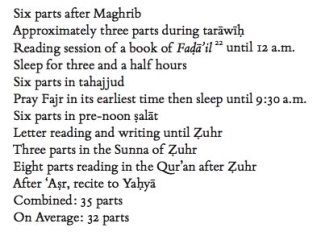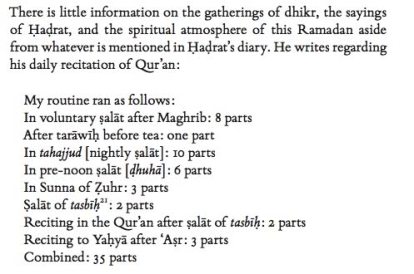Ramadhan is the one time of year when you see the best spiritual performance of a Muslim. It is in this time that Muslims best deeds are often seen. Its kind of like an annual Olympics for the Mu’mineen. Considering the vastness of the Ummah and the various groups and communities amongst the believing Muslims — one inevitably sees diverse ways of pursuing good deeds. I would like to share some of the best practices I have taken note of amongst various Muslim ulema in Ramadhan.
1) Answered Dua: The first is a piece of advice Muhammad AlShareef of AlMaghrib Institute once gave to his students. Make one specific dua asking Allah for that one thing throughout Ramadhan and you will see this dua answered guaranteed. I tried this a few years ago and found this approach to work but like anything, it does require sabr.
2) 100 Rakat Tarawih: The second practice is one I imagine few can do, but worth trying if you can muster the courage and if time permits. The 100 rakat Tarawih performed in parts of Yemen is a known practice of the Habaib shuyukh. The masajid have tarawih and qiyaam prayers spread out at different hours of the night, making it possible for one to do 20 rakat tarawih at one masjid and then move to the next masjid and perform 20 rakat tarawih there and so on until 100 rakat is achieved by Suhur time.
3) DIY Iftar: One of the simplest and easiest but most beneficial practices advised by Mufti Muhammad ibn Adam al-Kawthari and Imam Tahir Anwar is doing your own iftar and dinner at home. Ramadhan is a time of ibadat (worship), but we unfortunately turn it into a time of socializing with many dinner parties and iftar invites. So turn down invites for iftar and dinner parties citing Ramadhan as your excuse. The benefit of doing this is you have greater control on the hours of the night, your energy level, limiting food intake and creating a stable Ramadhan routine. Though you may be seen as anti-social, you be safe from the sins of the tongue insha’Allah, at least for the month of Ramadhan.
4) Guaranteed Laylatul Qadr: Another practice I have heard Turkish trained teacher Shaykh Naeem Abdul-Wali advise is the marfu’ hadith, “He who prays Isha in the last 10 nights in jamaat in Ramadhan, he has indeed acquired the Night of Qadr.” The shaykh tells us the hadith is weak, but that there is still virtue in acting on exhortations as fada’il al-amaal (virtuous acts) and if one cannot get the whole, to try their best to get a part of it. It goes without saying that we should cover all our bases in striving for a reward as immense as Laylatul Qadr!
5) Finishing the Qur’an Daily: Some of us may have heard of how Imam Abu Hanifa would complete the Qur’an 60 times in Ramadhan — that is finishing the Qur’an twice daily! But how exactly one would go about even doing one khatam (completion) of Qur’an in a day with a busy schedule? Well, Shaykh al-Hadith Zakariyya al-Kandhlawi was known to start and finish the Qur’an daily. This is the schedule he would follow and how many parts (juz) of Qur’an he’d complete in different Ramadhans in his life:
Taken from: Source
May Allah bless the teachers of this ummah who have kept the noble spirit of Ramadhan alive to our time.
Closing Advice:
Don’t make Ramadhan about physical fitness, make it about spiritual fitness and you will find success with both.
Treat each day like a journey from the city into an empty desert, where each day you sever your heart from something it hungers for until you find yourself with almost no wants.
Ask Allah for the best Ramadhan for you and the Muslims around the world.




:no_upscale()/cdn.vox-cdn.com/uploads/chorus_image/image/56414327/YTLogo_old_new_animation.0.gif)




Great post! Thanks for sharing. Really very useful and informative post.
By: Riri on July 7, 2014
at 10:23 am
nice Sharing about Ramadan
By: Kamran Khan on October 14, 2014
at 5:40 pm
nice post good article
Kaos Keluarga Muslim
By: dhikrstore on March 17, 2016
at 2:55 am